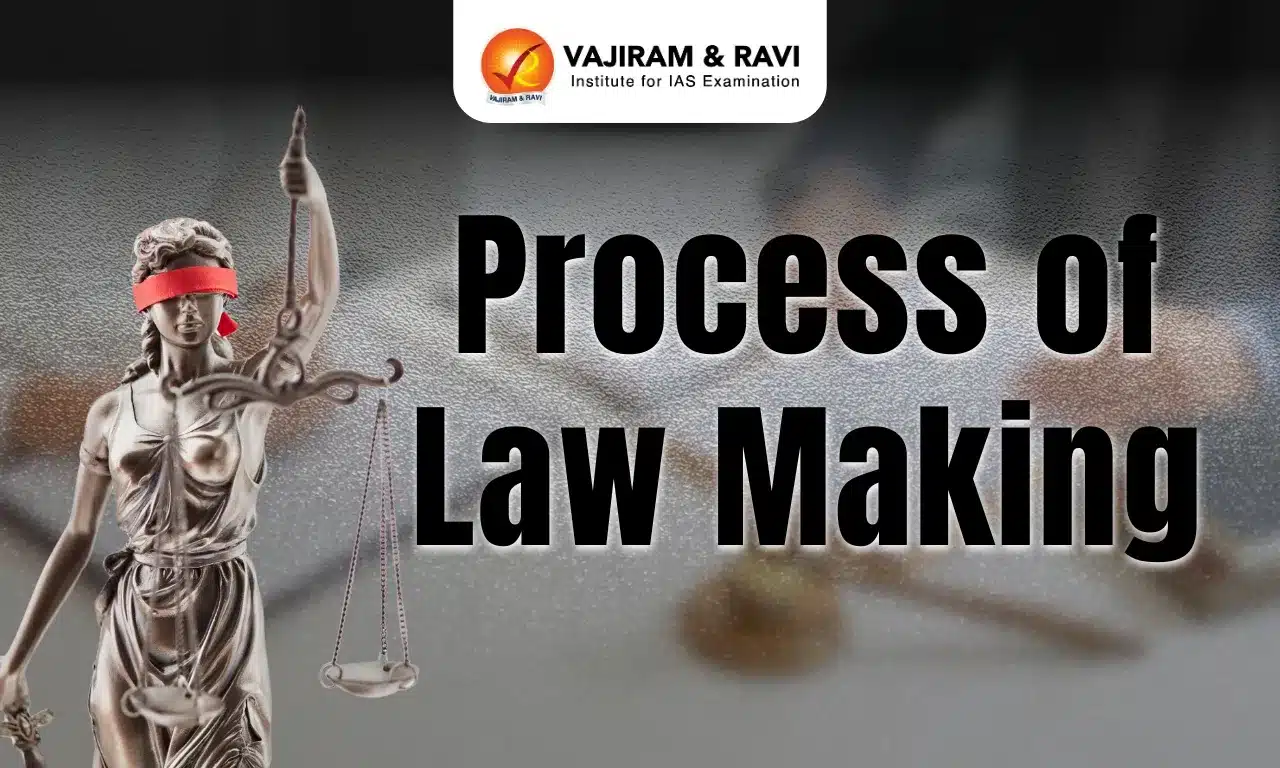What is the law-making function of the Parliament?
- The Parliament of India, comprising the President, the Rajya Sabha (Council of States) and the Lok Sabha (House of the People), is the supreme legislative body of the country. One of the main functions of the Parliament is to make laws for the country’s governance.
- The law-making process in the Parliament begins with the introduction of a bill and ends with the assent of the President. The Parliament also has the power to amend or repeal any existing law, as well as to delegate its law-making powers to other bodies such as state legislatures or local authorities.
What are the different types of bills that can be introduced in parliament?
Several bills can be introduced in the Indian Parliament:
- Ordinary bills: These are bills that relate to any matter other than financial or constitutional matters.
- They can be introduced in the Rajya Sabha or the Lok Sabha, and they follow a prescribed process to become law. (Articles: 107, 108, and 111)
- Financial bills: These are bills that relate to the imposition, abolition, alteration, or regulation of taxes, the borrowing of money, or the appropriation of money from the Consolidated Fund of India.
- They can only be introduced in the Lok Sabha, and they follow a prescribed process to become law. (Article: 117)
- Constitutional amendmentbills: These are bills that seek to alter the provisions of the Constitution of India.
- They must be passed by a special majority in both houses of the Parliament and the legislatures of at least half of the states. (Article: 368)
- Money bills: These are bills that contain only provisions dealing with all or any of the matters specified in the definition of a financial bill.
- They can only be introduced in the Lok Sabha and must be passed by it.
- The Rajya Sabha can only make recommendations on a money bill, and the Lok Sabha is not bound to accept any of these recommendations. (Articles: 109 and 110).
| Private members’ bills | Government bills |
|
|
|
|
|
|
Table: Classification of Bills (based on the individual who introduces)
What are the stages that an ordinary Bill has to pass through in Parliament to become a law?
Here is a summary of the stages that an ordinary bill has to pass through in the Indian Parliament to become law:
| Stages | Description |
| Introduction | A bill is introduced in either the Rajya Sabha or the Lok Sabha. |
| Reference to a standing/select committee | The bill is referred to a standing committee or a select committee for detailed examination and report. |
| Consideration and report by the committee | The committee considers the bill and submits a report to the house. |
| Discussion and voting in the house | The bill is placed before the house for discussion and voting. If passed, it is sent to the other house. |
| Consideration and voting in the other house | The bill is considered and voted upon in the other house. If
passed, it is sent back to the original house. |
| Resolution of differences | If there are differences between the two houses, a joint committee is constituted to resolve the differences. |
| Assent of the President | If the bill is passed by both houses, it is sent to the President for his/her assent. If given, the bill becomes an Act of Parliament. |
Table: Stages of a bill in the Parliament
What is joint sitting, and what are the conditions that call for joint sitting?
A joint sitting of Parliament in India is a session of both houses of Parliament (the Lok Sabha and the Rajya Sabha) sitting together as a single body.
As per Article 108 of the Constitution, a Joint session of Parliament can be summoned in the following situation:
- When a bill has been passed by one house of Parliament (either the Lok Sabha or the Rajya Sabha) but has been rejected or not returned by the other house within a specified time period. In this case, a joint sitting may be called to resolve the deadlock and allow the bill to be passed.
- When a bill has been passed by both houses of Parliament, but the President has returned it to Parliament for reconsideration. In this case, a joint sitting may be called to reconsider the bill and pass it again, if necessary.
Some of the provisions in joint sitting are:
- Joint sittings are chaired by the Speaker of the Lok Sabha.
- The rules of procedure for a joint sitting are the same as those for the Lok Sabha.
- Quorum for joint sitting is one-tenth of the total members of both houses.
- Joint sittings are typically called only as a last resort when other methods of resolving differences between the two houses of Parliament have failed.
- They are meant to ensure that important legislation can be passed and that the will of the majority is respected.
Bills so far passed in joint sitting
Since 1950, the provision regarding the joint sitting of the two Houses has been invoked only thrice. The bills passed at joint sittings are
- Dowry Prohibition Bill, 1960.
- Banking Service Commission (Repeal) Bill, 1977.
- Prevention of Terrorism Bill, 2002.
Last updated on April, 2025
→ UPSC Notification 2025 was released on 22nd January 2025.
→ UPSC Calendar 2026 is released on 15th May, 2025.
→ The UPSC Vacancy 2025 were released 1129, out of which 979 were for UPSC CSE and remaining 150 are for UPSC IFoS.
→ UPSC Admit Card 2025 is released now for CSE Prelims Exam 2025.
→ The UPSC Prelims 2025 is scheduled to be conducted on 25th May 2025 and UPSC Mains 2025 will be conducted on 22nd August 2025.
→ Apply once through it and aspirants can apply for various government exams conducted by UPSC.
→ The UPSC Selection Process is of 3 stages-Prelims, Mains and Interview.
→ UPSC Result 2024 is released with latest UPSC Marksheet 2024. Check Now!
→ UPSC Toppers List 2024 is released now. Shakti Dubey is UPSC AIR 1 2024 Topper.
→ Also check Best IAS Coaching in Delhi
Process of Law Making FAQs
Q1. What are the circumstances under which a Joint Sitting of the Parliament cannot be summoned?+
Q2. How is a Money Bill different from a financial bill?+
Tags: process of law making quest

















